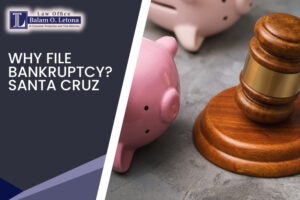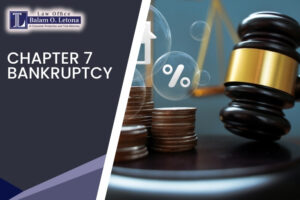The coronavirus pandemic will result in job losses and economic turmoil. The number of folks filing for unemployment jumped over 70,000 compared to the week before. Goldman Sachs predicts unemployment claims to reach over 2 million. Many of those immediately affected will be those in the hospitality industry, but economist expect it to spread to most sectors of the economy. As a Santa … [Read more...]
Bankruptcy
Why File Bankruptcy? Santa Cruz
For a better understanding of what experienced attorney Balam Letona can do for you, take the time to read this transcript or take a few minutes to watch the video. If you are asking, why file bankruptcy in Santa Cruz, Balam will help you through this process. You may be asking yourself “should I file bankruptcy?” Many people are very worried that they’ll never be able to get credit … [Read more...]
Chapter 7 Santa Cruz
Balam Letona has the experience and knowledge of California law in terms of Chapter 7 bankruptcy. Spend a few minutes watching this video or reading the transcript to get to know about Balam and how he can help with Chapter 7 in Santa Cruz. Chapter 7 bankruptcy is a total liquidation bankruptcy. You can eliminate most of your debt in Chapter 7 bankruptcy. You can also keep certain … [Read more...]
Why File Bankruptcy? Bankruptcy Law Santa Cruz
When people hear the word “bankruptcy” they often think only of the negative connotations or stigma associated with the term, so you may ask yourself, “why file bankruptcy?” The fact of the matter is that there are distinct advantages to declaring bankruptcy. By having an attorney who understands bankruptcy law in Santa Cruz, you can eliminate credit card debt, stop creditor harassment, stop wage … [Read more...]









